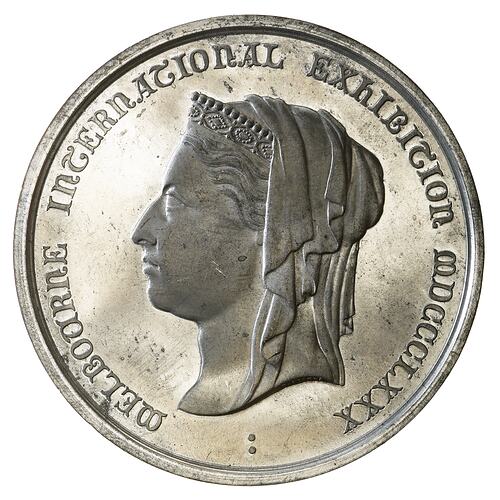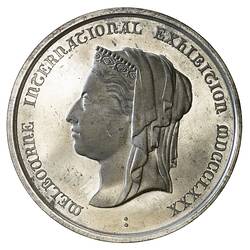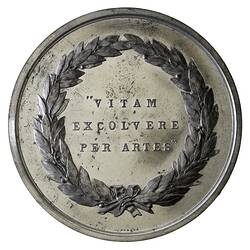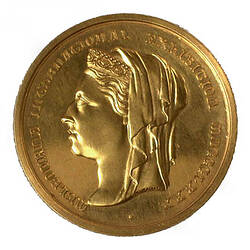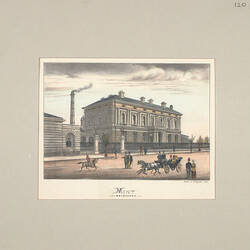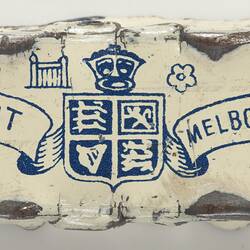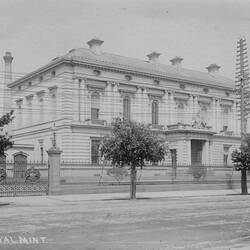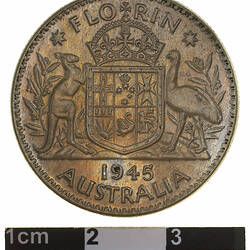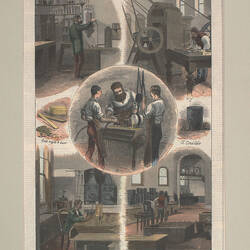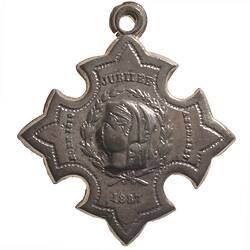Summary
Trial strike medal for the Melbourne International Exhibition bronze prize, 1880.
This medal was a test piece in soft 'white metal' for the large dies of the bronze prize medal. The Melbourne International Exhibition ran from 1 October 1880 to 30 April 1881. The exhibition building that still stands was constructed for the occasion, designed by Joseph Reed and built by David Mitchell. Over 1.3 million people visited the exhibition at a time when Melbourne's population was only around 282,000.
Minted in Melbourne.
Physical Description
This was a test piece in soft 'white metal' for the large dies of the bronze prize medal.. It features a head of Queen Victoria facing left wearing coronet and veil by Harry Stokes (name on truncation), with the legend MELBOURNE INTERNATIONAL EXHIBITION MDCCCLXXX : The reverse has the legend "VITAM / EXCOLVERE / PER ARTES" WITHIN A CLOSED OLIVE WREATH and the artist's name H. STOKES in small letters at the bottom
Obverse Description
Head of Queen Victoria, wearing small crown and veil left; around, MELBOURNE INTERNATIONAL EXHIBITION MDCCCLXXX .
Reverse Description
Within closed wreath, "VITAM / EXCOLVERE / PER ARTES"; below in small letters, H. STOKES
Edge Description
Plain
Significance
A competition for the design of a prize-winners medal for the 1880 Melbourne International Exhibition was arranged by the Exhibition Commission. A Committee was formed and a sketch produced to guide entrants to the competition. The competition was to be judged by V. Delves Broughton, Deputy Master of the Melbourne Mint, who would later oversee the actual production.
Broughton was not involved in the Committee's discussion about the preferred design, and was horrified when he saw the guide sketch that had been sent out to interested artists. The design was too complex (and, according to Broughton's correspondence, the relief too deep) to be produced. It appears he hastily wrote to each artist indicating that variations on the design were welcomed, and that the choce of winner would be based on which could be made from the thinnest guage of metal. He advised that the head of the Queen was unsuited to the task, and suggested that the Queen's head on the obverse of the Ashantee war medal by L.C. Wyon, featured in the Exhibition Catalogue, was a good model. Entrants were also directed to look at ancient medals and coins exhibited by the Mint.
The competition was won by Melbourne medallist and jeweller Ernst Altmann. The Melbourne Mint still rejected the design as too difficult to strike. Eventually a modified form of the Ashantee medal from the Sydney Mint presentation medal was used, combined with a simple reverse with wreath design entered by medallist Harry Stokes.
The medals were minted, and awarded in the folliwng manner. Gold, first prize with medal, for applications of new and useful principles, the production of useful machines, or great skill in manufacture, invention or design. Gold, second prize with certificate, for objects of art. Gold, third prize with certificate, for manufactures, products and industries of high merit. Silver and bronze medals were awarded for exhibits of lesser importance; silver and bronze level certificates were issued to lesser winners in each of these categories. -Sharples, John P. 1990. Medals as Art: Australia and the Meszaros tradition, p.16. - D. Tout-Smith 23/10/2003.
More Information
-
Collecting Areas
-
Acquisition Information
Transfer from National Gallery of Victoria (NGV), 15 Mar 1976
-
Date Issued
1880 AD
-
Issued By
-
Mint
Melbourne Branch of Royal Mint, Melbourne, Greater Melbourne, Victoria, Australia, 1880
-
Artist
Harry Stokes, Melbourne, Greater Melbourne, Victoria, Australia, 1880
-
Person Depicted
-
Inscriptions
MELBOURNE INTERNATIONAL EXHIBITION MDCCCLXXX . around veiled head of Queen Victoria, (obverse) "VITAM / EXCOLVERE / PER ARTES" within wreath, below wreath in small letters, H.STOKES (reverse) Plain (edge)
-
Series
-
Material
White metal
-
Axis
12
-
Classification
-
Category
-
Discipline
-
Type of item
-
Dimensions
76 mm (Outside Diameter)
Weight > 100 g. 76 mm. was 3 inches
-
Shape
Round
-
References
[Book] 1882. Official Record of the Melbourne International Exhibition 1880-1881.
-
Keywords
